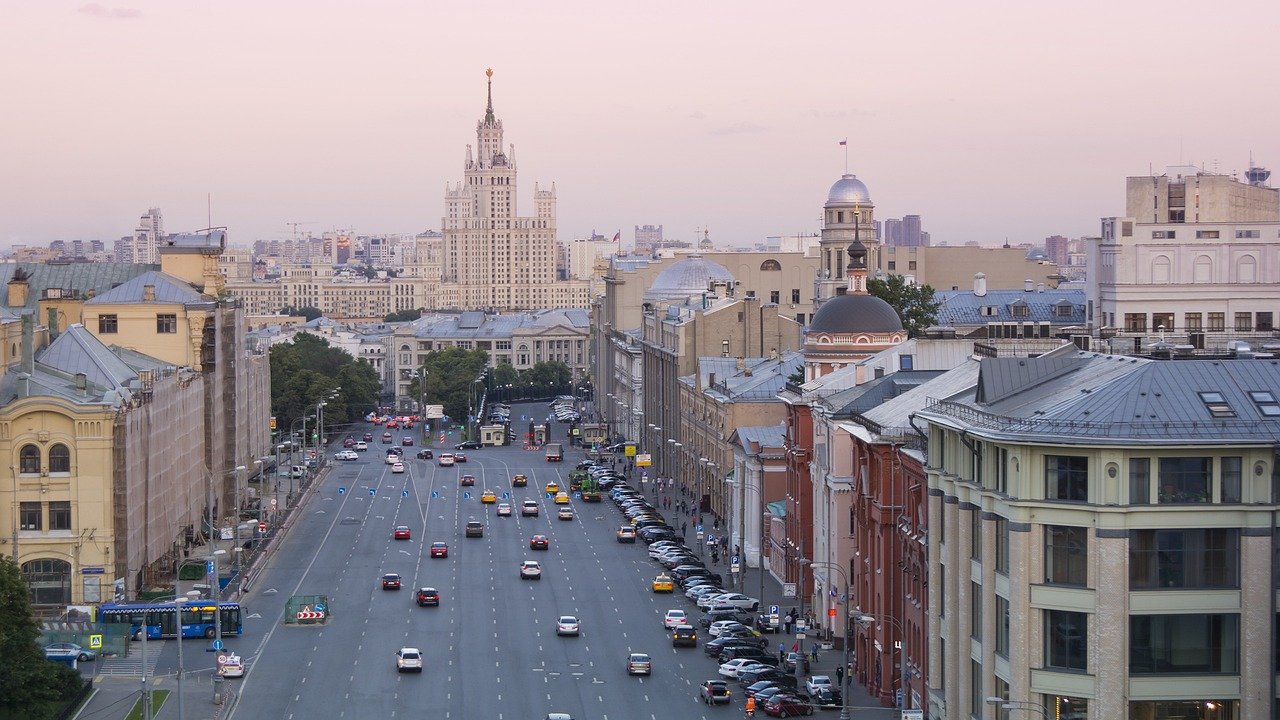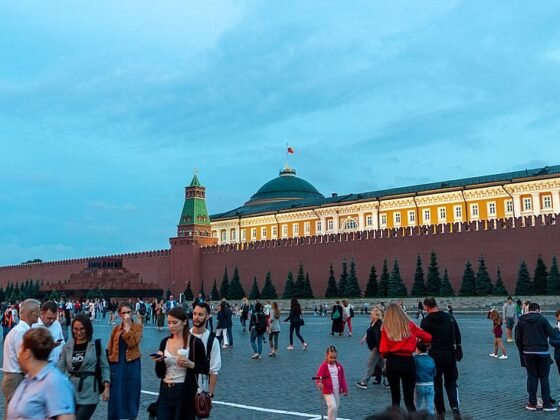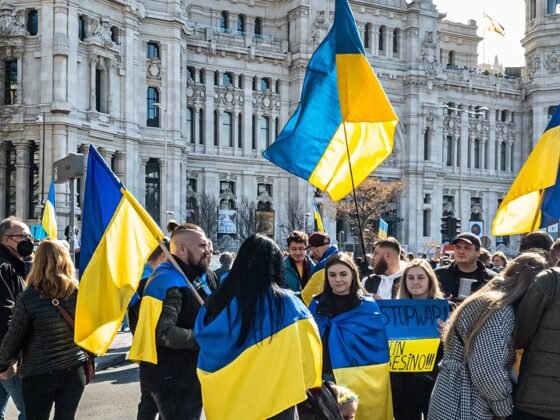Since Vladimir Putin invaded Ukraine on February 24, 2022, many observers have debated how to explain the seemingly widespread support for the war among Russians, which has remained fairly stable at 70-80 percent. The conventional explanations for the war which focus on Putin’s personality cannot explain why and how Russian society has rallied around not only this war, but also every other war Putin has started. Indeed, Levada Center studies have found that Russians tend to reward their political leadership for more aggressive international behavior.[1]
Building on studies and polls that posit Russian identity as a microfoundation of public support for the war, in 2023-24 Peter Pomerantsev, Graeme Robertson, and I ran a series of online experiments exploring the moderating role of identity salience in conditioning respondents’ willingness to support military escalation in Ukraine. We gave some respondents information about Putin’s support for peace talks, while telling others about his opposition to that policy. We then measured the strength of their association with Russia, as well as their pride in its culture, sports, literature, and other achievements. In line with experiments conducted shortly prior to the full-scale invasion of Ukraine, we find that learning about Putin’s support for peace talks did not change minds, but hearing about his opposition to such talks consistently increased respondents’ support for the war. These effects were moderated by the salience of respondents’ identity. All in all, a significant faction within Russian society appears to identify strongly with Russia and support militaristic action, a reality with which any future Russian leader will have to grapple. Generic counter-disinformation efforts would not only be inefficient but might even trigger a backlash among the target Russian audience.
Support for War: A Longstanding Phenomenon
Even if the ongoing invasion of Ukraine has been the most brutal, costly, and consequential of Vladimir Putin’s wars, the Russian public has repeatedly demonstrated quick shifts in public opinion to embrace military action on the part of the Kremlin. According to the Levada Center, in December 2021 only eight percent of Russians thought Russia should send military troops to fight against the Ukrainian government, but according to two surveys in February and March 2022, 68 percent and 80 percent of respondents, respectively, supported Russian troops’ actions in Ukraine. This dynamic echoed similar episodes in the past. For example, whereas in September 2015, 69 percent of Russians opposed direct military assistance to Syrian president Bashar al-Assad, already by early October 2015, 72 percent supported Russia’s bombing campaign in Syria.
While a sizable share of the Russian public seems to move in line with the Kremlin’s escalatory decisions, there is also evidence suggesting that a substantial share of Russians consistently back potential military aggression against neighboring states. For example, a poll conducted immediately prior to the 2022 invasion of Ukraine found that 50 percent of Russian respondents thought it would be right for Moscow to use military force to prevent Kyiv from joining NATO, with only 25 percent actively opposing such a move. One may question the reliability of polls conducted in 2022, but even back in 2014, they returned strikingly similar results. In September 2014, for instance, when asked whether they would support the deployment of Russian troops to Ukraine, 56.8 percent of Russian respondents (51 percent and 47 percent in Moscow and St. Petersburg, respectively) responded in the affirmative and only 19.6 percent in the negative. The respondents to that poll also supported sending troops to the Baltic countries, followed by the US, Japan, and Israel.
Understanding the nature of this phenomenon is critical to identifying ways to change this dynamic. But while the supply side of Russia’s influence operations (Putin’s goals and strategies) is well explored in the literature, its demand side remains understudied.
Identity and War Support
Many conventional explanations assign most of the blame for Russia’s war in Ukraine to Vladimir Putin, the personalistic autocrat on top of Russia’s power vertical.[2] However, this emphasis on Putin cannot explain why and how Russian society has coalesced, even if reluctantly, around every single war Putin has started, no matter how brutal and poorly motivated. Nor can this phenomenon be explained by a lack of information alone: in contrast to the Soviet era, today the Russian public has access to independent news on the war in Ukraine via the internet, VPNs, and relatives in Ukraine, which about 11 million Russians have.
There are few studies focusing on the microfoundations of support for war in Russia. Most of the literature to date has explored the factors conditioning support for the regime and Putin personally. Such studies have discovered a tendency toward conformity among sizable shares of Russian respondents.[3]
However, the tendency to fall in line with the Russian leadership does not explain the well-established reality that Russians tend to reward their political leadership for more aggressive international behavior. The Levada Center’s historical analysis shows, for instance, that Putin’s wars have consistently boosted Russians’ pride in the country and optimism about Russia’s direction, not to mention lifting Putin’s approval rating far above his average (with the 2022 all-out invasion as no exception).
Indeed, in a series of experiments conducted immediately prior to the 2022 invasion of Ukraine, Krishnarajan and Tolstrup show that Russian respondents’ preference for using military force is highly manipulable. Even a weak one-time propaganda treatment in the form of a vaguely described national security threat from a neighboring country significantly increases the Russian public’s support for war. After such a treatment, respondents’ support for using military force increased from 8 to 40 percent, a figure that rose to 48 percent with the addition of even a mild escalating statement from Putin himself. Strikingly, however, respondents’ preferences could be influenced only in one direction: even among Putin-supporters, de-escalating statements by Putin failed to significantly reduce support for war.
That even Putin’s engagement failed to decrease levels of war support hints at the moderating role of identity (the closeness of one’s association to the country) in this dynamic. Once its salience is activated for Russians, pulling them out of this condition appears quite hard. Indeed, other studies have more directly exposed the link between identity perception and support for military action.[4] Many Russians tend to equate the position of the authorities with the position of their country. This is aggravated by a widespread tendency toward blind patriotism—that is, the inclination to side with their country whether it is “right or wrong.” Accordingly, Russians appear to agree with many escalatory Kremlin’s actions by default while post-factum rationalizing[5] the motivation behind these actions.
The link between identity and war support is reinforced by the nature of Russian collective self-esteem and citizens’ deep-seated inferiority complex. During the Soviet era, their sense of being citizens of a superpower that dominated its neighbors and competed directly with the US offered ordinary Russians a feeling of collective unity that compensated for the humiliation and poverty they experienced in their daily lives. In the early post-Soviet period, that collective identity was lost as the Soviet system crumbled, but Russia failed to decisively break from its past and forge national cohesion around ideals other than quasi-Soviet ones. Much of the success of Putin’s aggressive foreign policy has depended on appealing to pre-existing and long-entrenched configurations of Russian mass consciousness and propagating a resentment-based identity of a humiliated but “reborn” nation.[6]
Borrowing heavily from the Soviet themes of exceptionalism, great power status, and the West as an existential threat to Russia, the Kremlin’s territorial conquests have allowed Russians to regain a sense of collective belonging behind a comfortable psychological shield against reality that deflected unpleasant questions about Russia’s past and future. Embracing their great power aspirations, a majority of Russians have supported Putin’s military adventures in Ukraine, which many of them view as a rightful part of their former empire.
Accordingly, polls indicate that a sense of Russian collective identity correlates with negative aspects such as fear, hatred, and derision by the West. Stronger identification with Russia also correlates with higher levels of collective narcissism (an unrealistic belief in a group’s greatness, contingent on external validation) and a sense of collective resentment (a perception that Russians are miserable and maltreated). Believing that “we are very good but no one loves us” is often associated among Russians with higher approval of violence and militarism. Thus, a 2023 study has shown that socio-psychological variables reflecting group identification and attitudes—such as secure national identification, national narcissism, system justification, and perceived international threat—were all positively correlated with support for a military operation in Ukraine, mobilization, violence against civilians, and even the use of nuclear weapons.
This argument is consistent with scholarship in contexts other than Russia that has flagged the importance of identity in moderating individual susceptibility to political messages. For example, the tendency to believe populist messages is moderated by a stronger attachment to national identity. Populist messages resonate with people’s attachment to an in-group they perceive as deprived.
Our Experiment
Based on this logic, in 2023-24 Peter Pomerantsev, Graeme Robertson, and I ran a series of online experiments hypothesizing that the strength of their association with Russia affects respondents’ susceptibility to militaristic narratives. Using a modified version of the Buckley et al. (2022) and Krishnarajan and Tolstrup (2023) experiments, we tested the extent to which information about Putin’s support for or disapproval of peace talks with Ukraine influenced our respondents’ own opinion on that issue. Respondents were divided into two treatment groups, with a third, control group simply being asked questions about their support for peace talks with Ukraine. The first treatment group received information about Putin’s support for peace talks, while the second group was told about Putin’s opposition to that policy.
The salience of identity was measured through a series of questions about the strength of respondents’ association with Russia, as well as their pride in its culture, sports, literature, and other achievements. We used a variety of Likert-scale questions to explore our respondents’ levels of patriotism, nationalism, collective narcissism, and other measures of national identification.
Most of these specifications returned the same results. Consistent with Krishnarajan and Tolstrup (2023), we found that in all surveys, the positive frame (Putin’s endorsement of talks) returned no statistically significant effect on support for peace talks. However, the negative frame (Putin’s opposition to peace talks) showed a consistently significant and substantively strong effect across direct responses with and without individual controls. Respondents in the group that received the negative treatment were less likely to support the idea of peace talks with Ukraine. Moreover, in line with our expectations, these effects were moderated by the salience of identity: the coefficient of the interaction between the identity and treatment variables was negative, substantive, and statistically significant.
Clusterization based on our identity-related variables returned three substantial groups: 1) “supporters,” with the highest values on the salience of identity (about 45 percent of the sample); 2) “loyalists,” for whom identity had lower salience (about 40 percent); and 3) “critics,” the group most conflicted about their identity (about 13 percent of the sample). We found that respondents in the first cluster were the most responsive to our negative frame.
Conclusion
Consistent with theoretical expectations, we find that support for the war in Ukraine is driven at least in part by the salience of one’s identity, i.e., the strength of respondents’ association with Russia. Unfortunately, our findings also suggest that support for the militaristic action has its microfoundations in the composites of Russian mass consciousness and is ideological in nature.
While it is common for scholars to focus on Putin when accounting for the origins of the war, our results pretty clearly show the opposite. There appears to be a significant faction within Russian society that identifies strongly with Russia and supports militaristic action, and any future Russian leader will have to deal with this group. In other words, Russia’s aggressive posture vis-à-vis its neighbors might change little even if the leadership were to change. Furthermore, it might be hard for Putin to pull out of the war now that it has begun. Accordingly, not only would generic counter-disinformation efforts be inefficient, they might even cause Russians to recoil and support the government and its actions even more. Future research should account for the role of Russians’ in-group attachment in exploring ways to decrease their war support.
Maria Snegovaya (PhD, Columbia University) is a forthcoming Adjunct Professor at Georgetown University’s CERES and a Senior Fellow with the Europe, Russia, and Eurasia Program at the Center for Strategic and International Studies (CSIS). The key focus of her research is democratic backsliding and re-autocratization in postcommunist Europe, as well as Russia’s foreign policy.
[1] L.D. Gudkov, “Reverse Totalitarianism,” Novoe literaturnoe obozrenie, 2022.
[2] Michael McFaul, “Putin, Putinism, and the Domestic Determinants of Russian Foreign Policy,” International Security 45 (2), 2020, pp. 95-139.
[3] Noah Buckley, Kyle L. Marquardt, Ora John Reuter, and Katerina Tertytchnaya, “Endogenous Popularity: How Perceptions of Support Affect the Popularity of Authoritarian Regimes,” American Political Science Review, 2023, pp. 1-7; Timothy Colton and Henry Hale, “The Putin Vote: Presidential Electorates in a Hybrid Regime,” Slavic Review 68(3), 2009, pp. 473-503; Samuel Greene and Graeme Robertson, “Affect and Autocracy: Emotions and Attitudes in Russia after Crimea,” Perspectives on Politics 20(1), 2022, pp. 38-52; Samuel Greene and Graeme Robertson, “Agreeable Authoritarians: Personality and Politics in Contemporary Russia,” Comparative Political Studies 50 (13), 2017, pp. 1802-1834; Henry E. Hale, “Authoritarian Rallying as a Reputational Cascade? Evidence from Putin’s Popularity Surge after Crimea,” American Political Science Review 116 (2), 2022, pp. 580-594.
[4] Olga Gulevich and Evgeny Osin, “Dark Triad and the Attitude toward Military Violence against Civilians: The Role of Moral Disengagement,” 2022 (draft available upon request); Olga Gulevich and Evgeny Osin, “Generalized Trust and Military Attitudes in Russia: The Role of National and Global Human Identification,” British Journal of Social Psychology 62(3), 2023, pp. 1566-1579.
[5] Laboratory of Public Sociology, “‘I Don’t Understand Politics.’ Why Do Russians Justify War? Results of a Study Conducted by the Laboratory of Public Sociology,” Vazhnye Istorii, February 23, 2024, https://istories.media/opinions/2024/02/23/ya-v-politike-ne-razbirayus-pochemu-rossiyane-opravdivayut-voinu/.
[6] Maria Snegovaya, “Chapter 5: Who Are We? Russia’s Identity-Building Failure,” in Failure. Russia under Putin, Brookings Institution Press, forthcoming in 2024.











